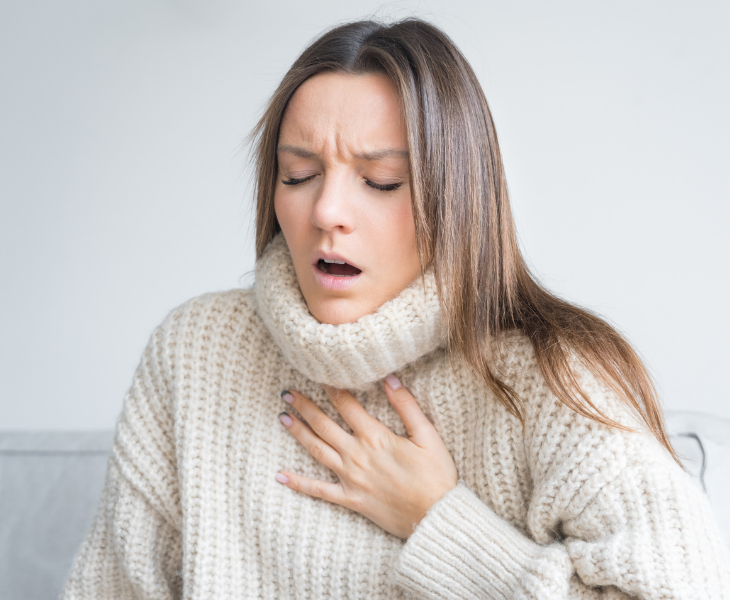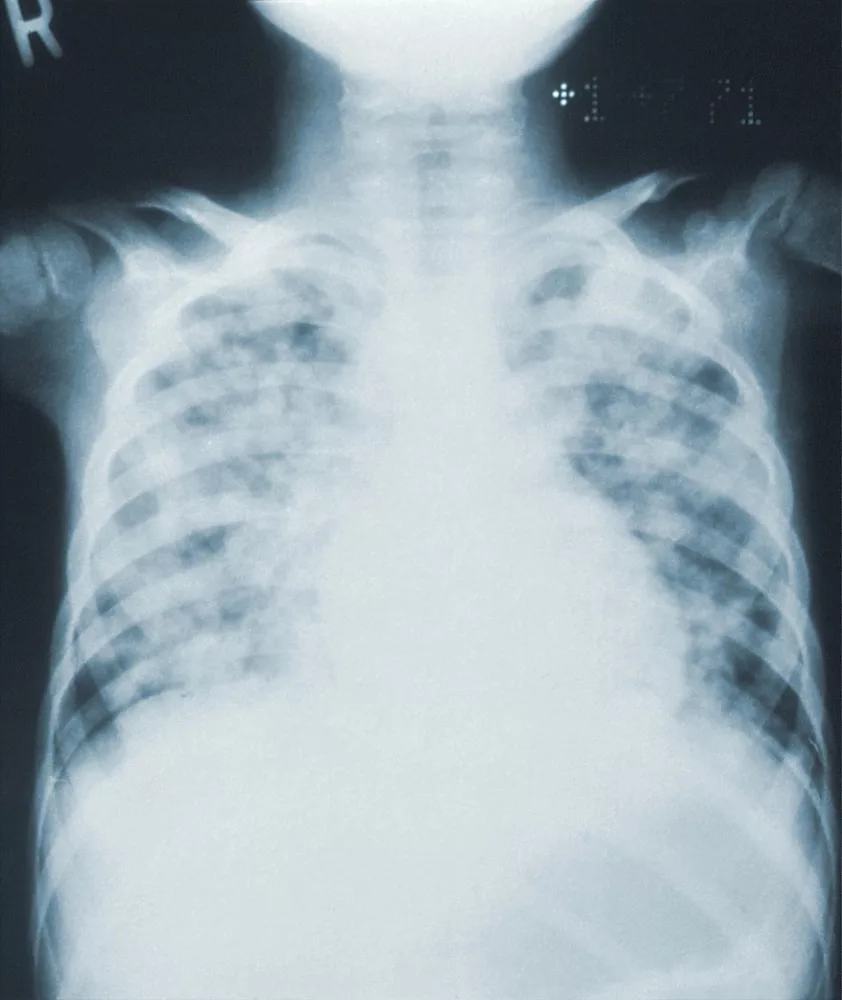Pneumonia, a common respiratory infection, affects millions of people worldwide each year. It occurs when the air sacs in the lungs become inflamed, filling with fluid or pus and making it difficult to breathe. Pneumonia can range from mild to severe, and it is crucial to identify the signs and symptoms early on to ensure prompt diagnosis and treatment.
In this article, we will explore the various pneumonia symptoms, empowering you to protect your respiratory health.
6 Signs & Symptoms of Pneumonia

1. Persistent Cough
One of the primary symptoms of pneumonia is a persistent cough. It may start as a dry cough but can progress to producing phlegm that is yellow, green, or even bloody. The cough is often accompanied by chest pain that worsens with deep breaths or coughing, indicating inflammation in the lungs.
2. Difficulty Breathing
As pneumonia affects the lungs, it can lead to breathing difficulties. People with pneumonia may experience shortness of breath, rapid breathing, or wheezing. These symptoms can range from mild to severe, depending on the extent of lung inflammation and infection.
3. Fever and Chills
Fever is a common response to infection, and pneumonia is no exception. A high body temperature, often accompanied by chills and sweating, may indicate the presence of pneumonia. However, it is important to note that not all cases of pneumonia cause a significant rise in body temperature, especially in older adults or individuals with weakened immune systems.

4. Fatigue and Weakness
Pneumonia can cause significant fatigue and weakness. This may be a result of the body’s immune response to the infection, as it expends energy to fight off the invading pathogens. If you notice an unexplained loss of energy or find yourself feeling unusually weak, it could be a sign of pneumonia.
5. Chest Pain
Chest pain associated with pneumonia can manifest in various ways. It may be a sharp, stabbing pain or a dull ache that intensifies with deep breathing or coughing. The discomfort is often localized to the affected area of the lung and may be exacerbated by certain body positions.
6. Confusion (in older adults)
Pneumonia can affect older adults differently than younger individuals. In addition to the typical symptoms, confusion or changes in mental awareness may occur. Older adults with pneumonia may become disoriented, have trouble focusing, or experience memory lapses. It is important to be vigilant and seek medical attention if you notice these signs in an older loved one.
Other Possible Symptoms
While the aforementioned symptoms are commonly associated with pneumonia, it is worth noting that the infection can also present with additional signs such as headache, nausea, vomiting, loss of appetite, and joint or muscle pain. These symptoms are more likely to occur in severe cases or when pneumonia is caused by certain types of bacteria.
What can you do at home if you have These Pneumonia symptoms?
If you suspect you have signs and symptoms of pneumonia, it is important to seek medical attention as soon as possible. Pneumonia can be a serious condition that requires professional medical evaluation and treatment. While waiting for medical assistance, there are a few things you can do at home to alleviate symptoms and support your recovery:
Rest and Hydration:
Ensure you get plenty of rest to allow your body to fight off the infection. Adequate rest helps conserve energy and promotes healing. Stay well-hydrated by drinking plenty of fluids such as water, herbal tea, and clear broths. Hydration helps thin mucus and eases coughing.
Use a Humidifier or Take Steamy Showers:
Moist air can help soothe the respiratory passages and relieve congestion. Consider using a humidifier in your room or spending time in a steamy bathroom to help ease breathing difficulties and loosen mucus.
Manage Fever and Pain:
If you have a fever or experience chest pain, over-the-counter medications like acetaminophen (paracetamol) or nonsteroidal anti-inflammatory drugs (NSAIDs) can help reduce fever and alleviate pain. However, it is essential to follow the recommended dosages and consult a healthcare professional if you have any concerns or if your symptoms worsen.
Stay Warm and Comfortable:
Keep yourself warm and comfortable by dressing in layers and ensuring your surroundings are at a comfortable temperature. Avoid exposure to cold air or drafts as they can exacerbate symptoms and make breathing more difficult.
Gargle with Saltwater:
If you have a sore throat or experience discomfort, gargling with warm saltwater can help provide relief. Mix half a teaspoon of salt in a glass of warm water and gargle several times a day. This can help reduce throat inflammation and soothe discomfort.
Avoid Smoking and Irritants:
Smoking and exposure to irritants like secondhand smoke, strong chemical fumes, or air pollution can worsen respiratory symptoms. It is crucial to avoid smoking and minimize exposure to these irritants to promote healing and protect your lungs.
Remember, while these home remedies may help alleviate symptoms, they do not replace professional medical care. Pneumonia requires proper diagnosis and treatment by a healthcare provider. They will assess the severity of your condition, prescribe appropriate medications, and determine if additional interventions, such as antibiotics or hospitalization, are necessary.
Always follow the advice and recommendations of your healthcare professional to ensure the best possible outcome for your health.
Conclusion
Recognizing the signs and symptoms of pneumonia is crucial for timely diagnosis and effective treatment. If you or a loved one experience persistent cough, difficulty breathing, fever, fatigue, chest pain, or any other concerning symptoms, it is important to consult a healthcare professional.
Prompt medical attention can help prevent complications and promote a speedy recovery, safeguarding your respiratory health and overall well-being.








